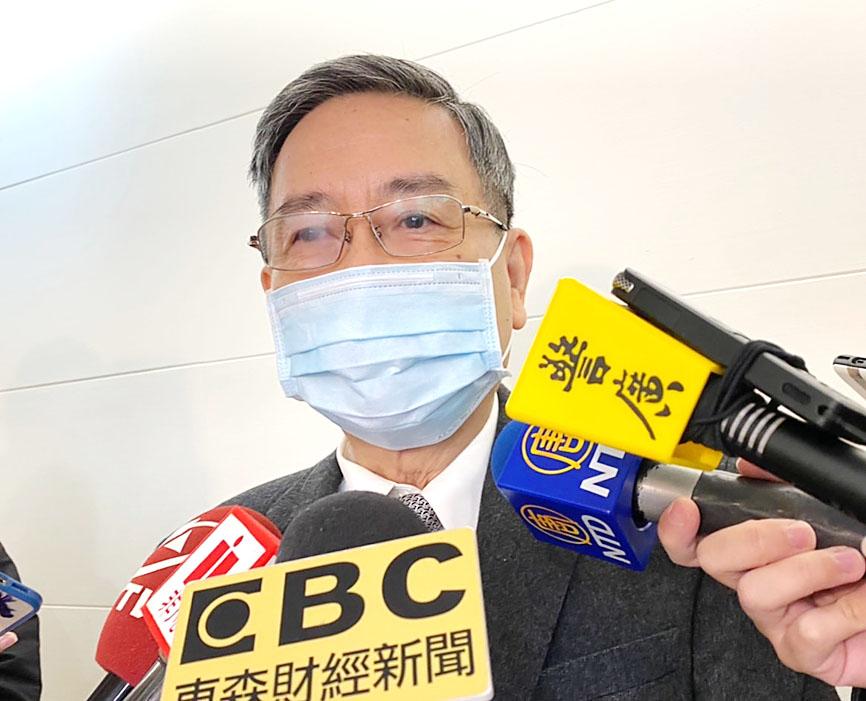The Yuanta-Polaris Research Institute (元大寶華綜經院) yesterday raised its forecast for GDP growth this year from 3.1 percent to 4.4 percent on the back of strong exports, but said that the showing would not be exceptional globally, giving the New Taiwan dollar little room to increase further against the US dollar.
Taiwan’s tech firms have gained importance in global electronics supply chains amid US-China trade tensions and the COVID-19 pandemic, making them major beneficiaries of the remote work and learning trends, as well as enhanced safety stock levels, Yuanta-Polaris president Liang Kuo-yuan (梁國源) said.
The phenomenon, referred to as the bullwhip effect, helps account for the unprecedented prosperity local electronics makers experienced last year and this year, Liang said.

Photo: Wu Chia-ying, Taipei Times
Exports might grow 5.16 percent this year, up from the previous forecast of 5 percent, while imports might increase 3.97 percent, down from 4.07 percent, the Taipei-based think tank forecast.
Private investment could expand 4.07 percent, while consumer spending might grow 3.73 percent, it said.
With projected GDP growth of 4.4 percent, Taiwan would rank somewhere in the middle worldwide, behind major economies such as the US and China, explaining why the NT dollar has lost some momentum against the greenback, it said.
“Global capital has ... flowed to the US market to pursue better investment opportunities,” Liang said.
Yuanta-Polaris expects the NT dollar to trade at an average of NT$28.5 this year versus the greenback. The local currency closed at NT$28.538 against the US dollar in Taipei trading yesterday.
Taiwan’s robust exports would continue to bolster its current account surpluses and countries with strong trade surpluses are unlikely to have a weak currency, Liang said.
The central bank would refrain from intervention next quarter, when the US is due to update its currency report after placing Taiwan on its watch list for currency manipulation in December last year, he said.
Taiwan meets two of the three criteria by having a trade surplus with the US of US$20 billion or more and a current account surplus in excess of 2 percent of GDP, but it can contest the criterion regarding one-sided intervention in the foreign exchange market, he said.
“Taiwan had better shake off currency manipulation charges or it might attract punitive measures from the US, the world’s largest economy,” Liang said.
While the pandemic poses the biggest uncertainty to the global economy, Taiwan should strive to solve water, land, electricity, labor and talent shortages that went unnoticed until the water shortage worsened, he said.
The government should learn from major tech firms in recycling wastewater or the problem could thwart the nation’s industrial development, he added.

CHIP RACE: Three years of overbroad export controls drove foreign competitors to pursue their own AI chips, and ‘cost US taxpayers billions of dollars,’ Nvidia said China has figured out the US strategy for allowing it to buy Nvidia Corp’s H200s and is rejecting the artificial intelligence (AI) chip in favor of domestically developed semiconductors, White House AI adviser David Sacks said, citing news reports. US President Donald Trump on Monday said that he would allow shipments of Nvidia’s H200 chips to China, part of an administration effort backed by Sacks to challenge Chinese tech champions such as Huawei Technologies Co (華為) by bringing US competition to their home market. On Friday, Sacks signaled that he was uncertain about whether that approach would work. “They’re rejecting our chips,” Sacks

NATIONAL SECURITY: Intel’s testing of ACM tools despite US government control ‘highlights egregious gaps in US technology protection policies,’ a former official said Chipmaker Intel Corp has tested chipmaking tools this year from a toolmaker with deep roots in China and two overseas units that were targeted by US sanctions, according to two sources with direct knowledge of the matter. Intel, which fended off calls for its CEO’s resignation from US President Donald Trump in August over his alleged ties to China, got the tools from ACM Research Inc, a Fremont, California-based producer of chipmaking equipment. Two of ACM’s units, based in Shanghai and South Korea, were among a number of firms barred last year from receiving US technology over claims they have

It is challenging to build infrastructure in much of Europe. Constrained budgets and polarized politics tend to undermine long-term projects, forcing officials to react to emergencies rather than plan for the future. Not in Austria. Today, the country is to officially open its Koralmbahn tunnel, the 5.9 billion euro (US$6.9 billion) centerpiece of a groundbreaking new railway that will eventually run from Poland’s Baltic coast to the Adriatic Sea, transforming travel within Austria and positioning the Alpine nation at the forefront of logistics in Europe. “It is Austria’s biggest socio-economic experiment in over a century,” said Eric Kirschner, an economist at Graz-based Joanneum

France is developing domestic production of electric vehicle (EV) batteries with an eye on industrial independence, but Asian experts are proving key in launching operations. In the Verkor factory outside the northern city of Dunkirk, which was inaugurated on Thursday, foreign specialists, notably from South Korea and Malaysia, are training the local staff. Verkor is the third battery gigafactory to open in northern France in a region that has become known as “Battery Valley.” At the Automotive Energy Supply Corp (AESC) factory near the city of Douai, where production has been under way for several months, Chinese engineers and technicians supervise French recruits. “They